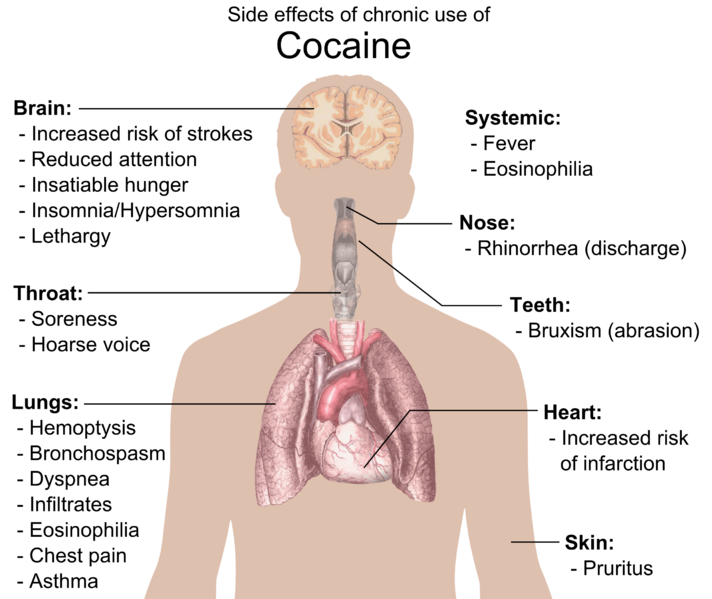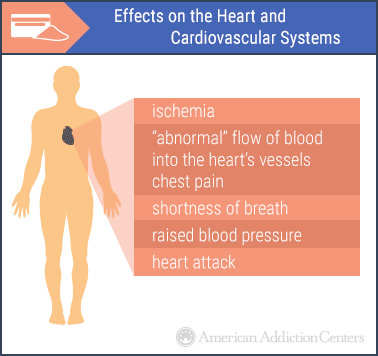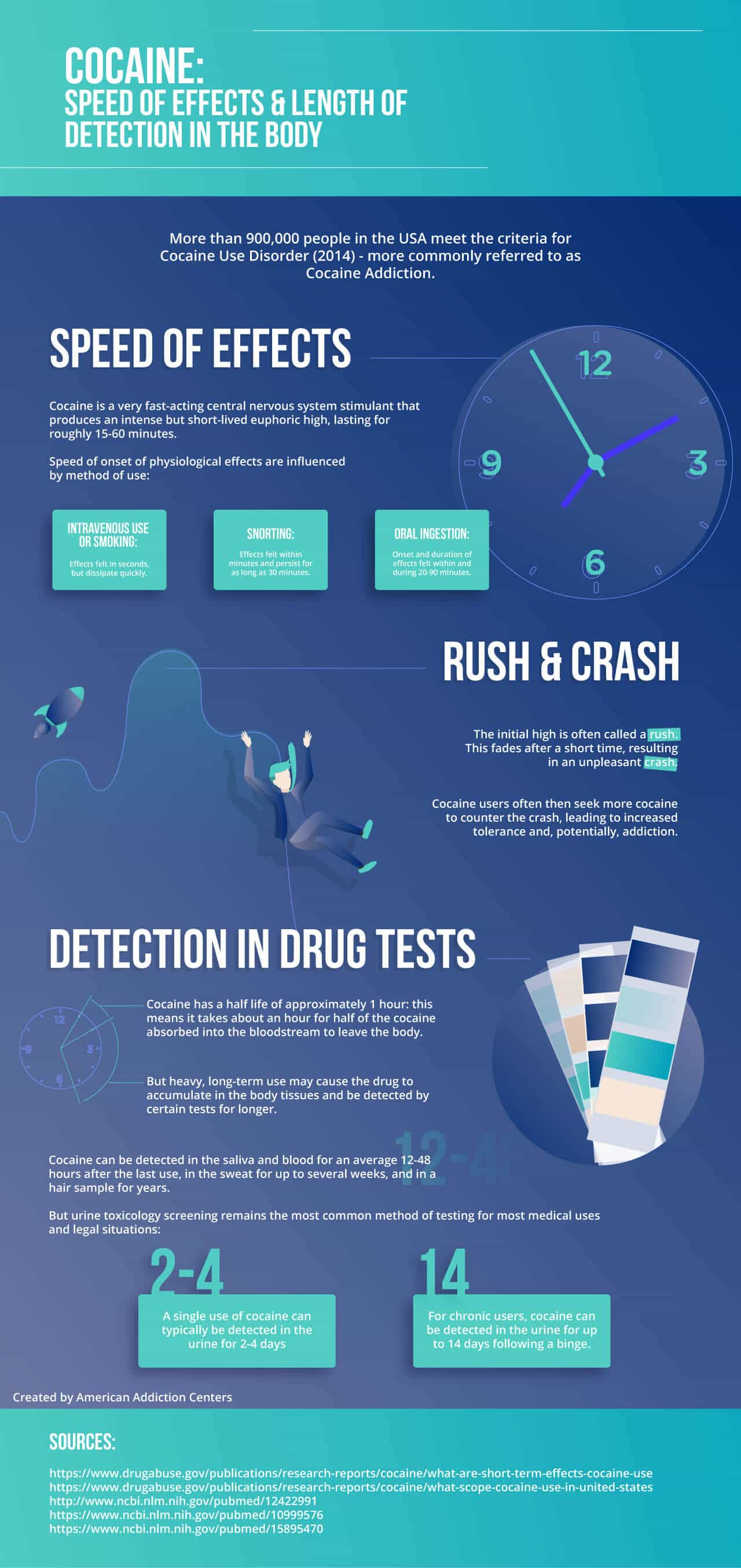Featured
What Does Cocaine Do To The Body
Loss of smell nosebleeds frequent runny nose and problems with swallowing. 7 Many chronic cocaine users lose their appetite and experience significant weight loss and malnourishment.
 How Bad Is Cocaine For Your Health The Recovery Village
How Bad Is Cocaine For Your Health The Recovery Village
It disrupts several important neurochemicals dopamine serotonin GABA norepinephrine and glutamate which could result in permanent motivation memory decision-making impairment.
/cocaine-and-the-heart-1745713-FINAL-5920eb89025e49569b7acfe4b66c8f9a.png)
What does cocaine do to the body. This keeps the body and brain from getting the nutrients it needs to function in a healthy manner leaving you vulnerable to infections and illnesses your body cant fight off. It reduces blood flow in the gastrointestinal tract which can lead to tears and ulcerations. Each time cocaine is used it causes a rapid spike in energy levels heart rate blood pressure breathing body temperature and often anxiety.
You may hear it called a stimulant. The risks of cocaine use are high for anyone who uses it regardless of age and your current health. Cocaine can increase ones heart rate making it speed up as the organ works overtime to adjust to the impact of the drug.
Its made from the coca plant which is native to South America. Even if the person does not develop psychosis or paranoia they could develop anxiety panic disorders or. Read more to find out what cocaine does to your body and brain.
Cocaine is a highly addictive drug that ups your levels of alertness attention and energy. In addition the demand for myocardial oxygen placed on the body by cocaine can increase the blood pressure of individuals and overall put them at risk for a cardiovascular incident. Cocaine can also affect the throat causing individuals to feel a strange sensation after use.
The danger is that people abusing cocaine can lose weight and become malnourished. When it comes to what does cocaine do to the body while being used in small doses it constricts blood vessels dilates pupils and increases body temperature. Dopamine is a neurotransmitter that facilitates pleasurable feelings.
Cough asthma respiratory distress and higher risk of infections like pneumonia. Some people report feeling intense euphoria while others report sensations of anxiety pain and hallucinations. This damage can be both acute and chronic and the severity of which can vary depending on the route of.
Cocaine raises the bodys temperature and the person who sweats excessively can easily become dehydrated causing damages to vital organs including the brain heart kidneys and liver. The key ingredient in cocaine the coca leaf. Over-heating and an inability to regulate temperature is a dangerous.
The drug numbs the pain but it can cause redness a running nose and eventually septum damage. Repeated cocaine use disrupts the way your brain cells communicate causing neurons to die off. In some cases cocaine use can damage the upper area of the mouth.
Users may also experience tremors nausea dilated pupils and restlessness. Heavy and prolonged cocaine use can damage your brain cells. When a person uses cocaine nose damage may also include major changes to the nasal structure resulting in a collapse of the structure.
This can cause breathing problems making it harder for individuals to breathe. Cocaine increases stress hormones like cortisol in the brain which can in turn raise blood pressure permanently damaging the cardiovascular system. The three-pound control center of the human body cocaine does quite a number on your most important organ.
Cocaine can cause swelling edema hemorrhaging barotrauma inflammatory nodules granulomas severe bronchial inflammation and infection. Cocaine seems to cause fundamental changes to our metabolism. The areas of the brain most impacted by the drug include sites that have dopamine synapses where cocaine binds.
Cocaine damages many other organs in the body. If youve already taken it or are thinking about taking it you may be worried about what cocaine can do to your body and brain. Some long-term health effects of cocaine depend on the method of use and include the following.
When cocaine is used in small amounts the side effects of cocaine use can include talkativeness alertness euphoric feelings as well as hypersensitive to sights and sounds. Cocaine is toxic to the nasal tissue it passes through before it is absorbed into the bloodstream. A loss in appetite is one of the most common symptoms of cocaine use.
Cocaine affects everyone differently. Cocaine is a highly addictive substance that binds to the reward and pleasure sensors in the brain creating a positive association for the substance. Effects of cocaine on body and brain.
Your arteries will constrict which can block blood flow to the heart and even cause a heart attack.
Physical And Mental Effects Of Cocaine
 Cocaine Health Promotion Brown University
Cocaine Health Promotion Brown University
 How Long Does Cocaine Stay In Your System The Recovery Village Drug And Alcohol Rehab
How Long Does Cocaine Stay In Your System The Recovery Village Drug And Alcohol Rehab
/cocaine-and-the-heart-1745713-FINAL-5920eb89025e49569b7acfe4b66c8f9a.png) How Cocaine Affects The Cardiovascular System
How Cocaine Affects The Cardiovascular System
 The Short And Long Term Effects Of Cocaine Banyan Chicago
The Short And Long Term Effects Of Cocaine Banyan Chicago
/cocaine-high-012-5a59243f7bb28300378bc666.jpg) Understanding The Feelings Of A Cocaine High
Understanding The Feelings Of A Cocaine High
 Mind Matters The Body S Response To Cocaine Nida For Teens
Mind Matters The Body S Response To Cocaine Nida For Teens
/comedown-crash-rebound-effect-after-drugs-4171269_final_edit1-38448d100a4b47ccb2d560d13e426a5c.png) Comedown Crash Or Rebound Effect After Taking Drugs
Comedown Crash Or Rebound Effect After Taking Drugs
 The Permanent Effects Of Drugs On The Body
The Permanent Effects Of Drugs On The Body
 Cocaine Withdrawal Symptoms Timeline The Recovery Village
Cocaine Withdrawal Symptoms Timeline The Recovery Village
Cocaine Physical And Mental Effects
 How Long Does Cocaine Stay In Your System Blood Urine Saliva
How Long Does Cocaine Stay In Your System Blood Urine Saliva
/harm-reduction-tips-for-cocaine-users-21993-5a22359c41b244c1baea99ebfa8a9967.png) Harm Reduction Strategies When Using Cocaine
Harm Reduction Strategies When Using Cocaine
 How Bad Is Cocaine For Your Health The Recovery Village
How Bad Is Cocaine For Your Health The Recovery Village
Comments
Post a Comment